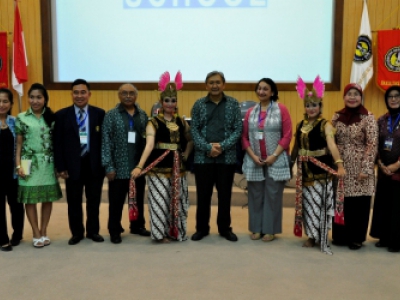Authentic Assessment to Improve the Teaching and Learning Process at Schools

To improve the quality of education in Indonesia, the government has launched the 2013 curriculum for primary and secondary education levels. The approach applied in this curriculum is different from the previous curriculum that is scientific approach.
Nowadays, teachers need to develop different teaching strategies from the ones they have used in the implementation of the previous curriculum. Beside, teachers are required to develop techniques for evaluating students’ achievements which are relevant to scientific approach. This form of evaluation should be able to describe the students’ achievements in observing, experimenting, social networking, and etc.
Authentic assessment is conducted during the class and focuses on the complexity and contextual tasks which enable the students to perform their competences in a more authentic structure. However, authentic assessment is not easy to administer.
Based on that ground, the Department of Educational Research and Evaluation at YSU Graduate School held an international seminar entitled International Conference on Educational Research dan Evaluation (ICERE) 2014 bringing up the theme that is ‘Authentic Assessment for Improving Teaching Quality’ (Saturday-Sunday, November 8th-9th 2014) at YSU Conference Hall.
This conference was officially opened by Prof. Dr. Rochmat Wahab, M.Pd., M.A., the Rector of YSU. “We do hope that through this meeting we can share our experience and also up date our knowledge related to authentic assessment to improve the quality of the teaching and learning process at schools. Beside, participants, whose backgrounds are assessment experts, policy makers, students, and practitioners, are expected to benefit from joining the conference.”
The conference presented keynote speakers from the United States, Thailand, and Indonesia. They are Madhabi Chatterji, Ph.D. from Columbia University, US, Dr. Pongthep Jiraro from Burapha University, Thailand, dan Prof. Dr. Paulina Panen from Universitas Sampoerna, Indonesia Madhabi Chatterji, Ph.D. presentation was entitled 'Classroom Assessment:
Theory, Implementation, and the Proximal Assessment for Learner Diagnosis (PALD) Model'. Here, Madhabi, who is also the member of the American Evaluation Association (AEA), discussed three main points consisting of general theories and principles for conducting classroom assessment, the comparison between classroom assessment and large scale assessment in US, basic theories, research, research findings, and the future of the Proximal Assessment for Learner Diagnosis (PALD) Model.
The second keynote speaker, Dr. Pongthep Jiraro, presented his paper entitled ‘the Implementation of Authentic Assessment’ which discussed measurements, item analysis, testing, evaluation, and concepts and principles in authentic assessment.
Prof. Dr. Paulina Panen, a member of the academic staff at the Directorate of Higher Education of the Republic of Indonesia, presented he paper entitled ‘Creative Teaching’. In her paper, she highlights that students are creative in nature and teachers should help them to develop their creativity.
After the three keynote speaker presentations, the partcipants joined the parallel session. The parallel session consisted of 50 paper presentations under 3 themes that is 'Issues of Classroom Assessment Implementation, Implementation of Authentic Assessment, dan Developing a Strategy of Creative Teaching'. (Yuliana)

